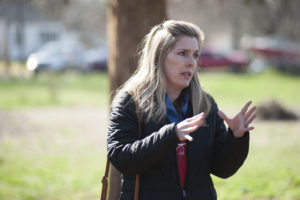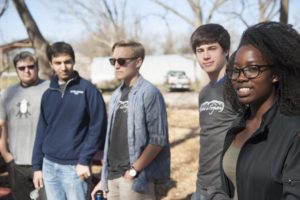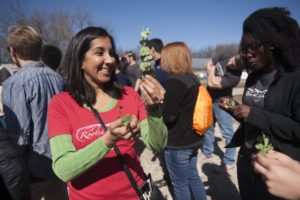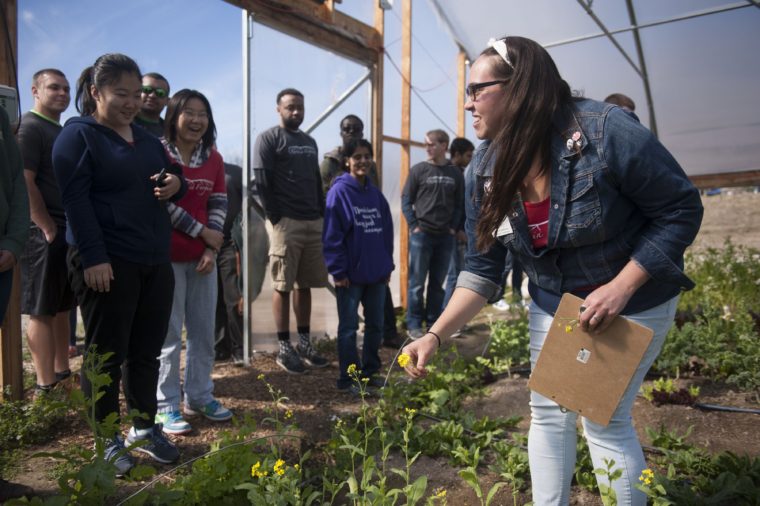Why did the Challenger shuttle explode?
The short answer: the faulty design of its O-rings. But the real culprit, experts found, was a NASA culture that sacrificed safety for expediency.
For years Sandra Matteucci, lecturer and director of the Engineering Communication Center, has explored the Challenger in her ethics class, “Engineering Ethics and Sustainability.” The disaster is a profound example of the life-and-death decisions engineers are called to make. This semester, however, she set the course in a city that has suffered its own tragedy: Ferguson.

“The problems at NASA existed long before the Challenger disaster, just as the issues in Ferguson existed before the protests,” Matteucci says. “This class explored the parallels. What happens when systemic problems are ignored?”
Titled “Destination Ferguson: Looking at Urban Sustainability Challenges Through the Lens of Engineering Ethics, Leadership and Conflict Management,” the class of 20 engineering students met daily in Ferguson during spring break. They spent a day at the Challenger Learning Center in Ferguson, ate in Ferguson restaurants, visited Ferguson businesses and attended class in the Ferguson Community Center, where the Ferguson City Council recently approved a federal plan to improve its police and courts.
There they heard from those close to the Ferguson conflict — Arch City Defenders founder Thomas Harvey, a leading champion of municipal court reform; St. Louis Public Radio political reporter Jason Rosenbaum, who covered the protests and ensuing political fallout; educator Tony Robinson, who has helped turn around the nearby Jennings School District; and Ferguson library director Scott Bonner, who kept the library open during the protests, transforming it into a de facto school for children.
But they also explored engineering case studies, such as the Love Canal Superfund site and the Bridgeton Landfill fire, where technical decisions were made without consideration of the broader community.
By the end of the week, senior Thomas Brunoni saw the connections.
“Engineers solve problems; it’s what we do,” says Brunoni, a senior studying chemical engineering. “We learn how systems work and how the variables interact. For me, that’s understanding the relationship between molecules. But in communities, the relationships are between people and institutions. And here, the system failed.”
Matteucci tells her students many of the hardest decisions they make on the job will be ethical, not technical.
“We all assume, ‘We’re good people, we’ll do the right thing,’” says Matteucci. “But that’s before you see the shades of gray and competing interests. You need to know how to put your ethical thinking into action. You’re going to encounter people, whether it’s in the plant or City Hall, who say, ‘This is too expensive’ or ‘This is an acceptable risk.’ That’s why you also need leadership, negotiation and communication skills.”

Olivia Williams, a junior studying biomedical engineering, says the class’s exercises, which included a simulated–nuclear-power-plant crisis and a rocket-building challenge, will help her develop those skills.
“For me, being hands-on and engaging in teams are a bonuses for a course that tackles human-centered issues,” Williams says. “Somehow, within the short five-day immersion part of the class, I found renewed inspiration to become aware of the needs our communities face.”
Senior Nana Kwame Sakyi Owusu agrees that class prompted him to think about his work from a new perspective.
“As engineers, we are stereotypically seen as people with high IQs but not very emotionally in tune with what’s happening around us,” says Owusu, who is studying computer science. “It’s very easy to get wrapped up in the fun of coding — to solve the puzzle — but it’s important to step back and ask, ‘How am I impacting people?’”

Co-instructor Seema Mukhi Dahlheimer, in collaboration with engineering librarian Lauren Todd, is organizing an end-of-semester poster symposium for the students to showcase their research and community engagement projects resulting from the class.
The class was funded by the Gephardt Institute for Civic and Community Engagement through its Civic Engagement Fund and the School of Engineering & Applied Science as part of an initiative to expand teaching and research that benefits the St. Louis community. Currently, Washington University offers some 75 courses with a community-engagement component.
Matteucci and Dahlheimer plan to bring the class back to Ferguson next spring. The course is just one way the School of Engineering students, faculty and alumni are engaged with the Ferguson community.
David Dwight, who graduated in 2015 from the School of Engineering & Applied Science with a degree in biomedical engineering, served as an intern and communications and media fellow for the Ferguson Commission.
And Ron Cytron, professor of computer science and engineering, researched current voting practices in the Ferguson-Florissant School District, where the demographics of the school board do not reflect the population. Cytron’s course, “Fair Division in Theory and Practice,” further analyzed and evaluated those practices.
“As a school, it matters greatly to us that our students know what it means to be both ethical engineers and ethical members of their community,” Matteucci says.
